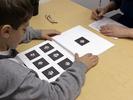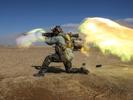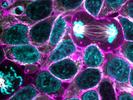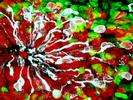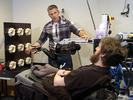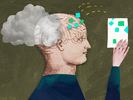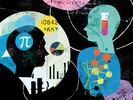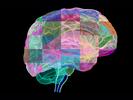Jon Hamilton appears in the following:
Brain Area That Recognizes Faces Gets Busier And Better In Young Adults
Thursday, January 05, 2017
From birth through age 30 or so, our ability to recognize faces keeps improving, research shows. At first, kids discern adult faces better than other kids' mugs. Not so after adolescence.
As Sleep Improves, So Does An Injured Brain
Wednesday, December 21, 2016
After a serious brain injury, people often sleep just a few minutes at a time. As the brain heals, sleep patterns begin to return to normal. The link suggests restoring sleep could improve recovery.
Pentagon Shelves Blast Gauges Meant To Detect Battlefield Brain Injuries
Tuesday, December 20, 2016
The military hoped the body-worn sensors would identify troops with brain injuries from a bomb blast. Instead, the sensors showed service members may be at risk from firing their own weapons.
Zap! Magnet Study Offers Fresh Insights Into How Memory Works
Thursday, December 01, 2016
A magnetic pulse to a certain spot in the brain of healthy volunteers restored recently "forgotten" thoughts, researchers found. The study is shifting the understanding of short-term recall.
Glowing Human Cells May Shed Light On Sickness And Health
Wednesday, November 30, 2016
Researchers who developed a collection of human stem cells with glowing internal structures have begun sharing them with colleagues. The glow reveals the secret workings of cells.
Your Dog Remembers Every Move You Make
Wednesday, November 23, 2016
Our canine pals remember lots of facts, like where to find the food bowl. Now there's evidence they also have aspects of "episodic memory," which allow them to relive experiences and events.
Heavy Screen Time Rewires Young Brains, For Better And Worse
Saturday, November 19, 2016
Bombarding young mice with video and audio stimulation changes the way the brain develops. But some scientists think those sorts of brain changes could protect kids from stressing out in a busy world.
'Minibrains' Could Help Drug Discovery For Zika And For Alzheimer's
Sunday, November 13, 2016
Each lab-grown cluster of human cells fits on a pin's head, but contains some of the cell types and circuitry of a real brain. The structures already are offering insights into how Zika attacks.
Brain Implant Restores Sense Of Touch To Paralyzed Man
Thursday, October 13, 2016
A mind-controlled robotic arm has pressure sensors in each fingertip that send signals directly to a paralyzed man's brain. It's still experimental, but could eventually help thousands, engineers say.
Brain Game Claims Fail A Big Scientific Test
Monday, October 03, 2016
When a team of researchers evaluated the scientific literature on brain games, they found little evidence that the products improve memory or thinking in real-world tasks.
Rats That Reminisce May Lead To Better Tests For Alzheimer's Drugs
Thursday, September 29, 2016
Most potential Alzheimer's drugs are tested on mice. But rats may be a better choice because they seem to have a type of memory that's more like ours, and also are highly vulnerable to Alzheimer's.
War Studies Suggest A Concussion Leaves The Brain Vulnerable To PTSD
Monday, September 26, 2016
Troops returning from Iraq and Afghanistan are far more likely to develop post-traumatic stress disorder if they have suffered a concussion. The reason may be a change in the brain's fear circuits.
How A 'Sixth Sense' Helps Simone Biles Fly, And The Rest Of Us Walk
Wednesday, September 21, 2016
Scientists are finally beginning to understand proprioception, a sense that tells us where our body is in space. Much of what they've learned comes from two girls with a rare genetic disorder.
When Blind People Do Algebra, The Brain's Visual Areas Light Up
Monday, September 19, 2016
A study of 17 people who have been blind since birth found that areas of the brain usually devoted to visual information become active when a blind person is solving math problems.
Test Of Experimental Alzheimer's Drug Finds Progress Against Brain Plaques
Wednesday, August 31, 2016
Researchers have failed repeatedly in their efforts to slow or halt Alzheimer's disease. But there are hints that an experimental drug can do what previous medicines could not.
Surfers And Scientists Team Up To Create The 'Perfect Wave'
Tuesday, August 30, 2016
Surfers once deemed man-made waves weak and mushy compared to the best that break along the coast. Then engineers and an 11-time world champion surfer showed just how good an artificial wave can be.
Despite Lessons From 2009 Quake, Buildings In Italy Remain Vulnerable
Wednesday, August 24, 2016
Earthquakes are common in central Italy. After the 2009 quake in L'Aquila, there were stricter building codes and recommendations for new construction. But many older buildings remain vulnerable.
Olympic Athletes Still Use Some Rx Drugs As A Path To 'Legal Doping'
Wednesday, August 10, 2016
Hundreds of elite endurance athletes were taking the prescription heart drug meldonium until it was banned in January. But a similar heart drug, telmisartan, is still allowed.
A Soldier-Scientist's Insights Expand Understanding Of Brain Injuries
Monday, August 01, 2016
Harvard researcher Kit Parker put his academic career on hold to serve in the Army in Afghanistan. When he returned from war, he made a discovery that changed our understanding of brain injuries.
A Sniff Test For Alzheimer's Checks For The Ability To Identify Odors
Tuesday, July 26, 2016
New research suggests it may be possible to spot people in the early stages of Alzheimer's by testing their ability to recognize fragrances. The goal is a quick and inexpensive screening test.
